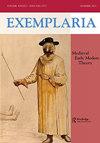吃得好/吃得好:罗得妻子的愚昧和盐在洁净中的智慧
IF 0.3
4区 历史学
0 MEDIEVAL & RENAISSANCE STUDIES
引用次数: 0
摘要
在将罗得妻子的惩罚归因于烹饪中误用盐的过程中,这位清洁诗人证明了盐在中世纪文化话语中作为一种令人烦恼和不稳定的象征的潜力。诗人对罗得妻子受到惩罚的理由,非但没有阐明神的正义,反而暴露了她的故事在道德背景上的不一致。在圣经中,以及在中世纪的社会和知识领域中,“洁净”一词偏离了对盐的主要偏爱,在这些领域中,它与祭祀、契约、保存、餐桌友谊和谨慎联系在一起。本文以德里达的敌意概念为基础,探讨了盐在《洁净》中是如何考虑到共生仪式中潜在的敌意或胁迫的,通过这种仪式,基督教集体被塑造出来。此外,我认为罗得妻子作为盐舔的命运确立了“被吃的人”作为一个主题,为《洁净》中许多关于盛宴的讲道性表述增添了辛辣,从《婚礼盛宴》到《巴尔塔扎尔的盛宴》。通过破坏罗得妻子的惩罚传统上所支撑的模范结构,盐的背景故事指向了不可思议,作为诗歌对共通性的微妙解构的一条途径。本文章由计算机程序翻译,如有差异,请以英文原文为准。
Eating Well/Well Eaten: Lot’s Wife’s Folly and the Wisdom of Salt in Cleanness
In attributing the punishment of Lot’s wife to a culinary misuse of salt, the Cleanness-poet evinces salt’s potential as a vexed and unstable signifier in medieval cultural discourse. Far from clarifying the workings of divine justice, the poet’s rationale for Lot’s wife’s punishment actually exposes the inconsistencies of her story in its moral setting. Cleanness deviates from the predominantly favorable coding of salt in the Bible and in various medieval social and intellectual domains, where it was associated with sacrifice and covenant as well as preservation, table-fellowship, and prudence. Building on Derrida’s concept of hostipitality, this article investigates how salt figures in Cleanness’s consideration of the hostility or coercion latent within rituals of commensality, through which the Christian collective is modeled. Furthermore, I propose that the fate of Lot’s wife as saltlick establishes “the eater eaten” as a topos that adds piquancy to Cleanness’s many homiletic representations of feasting, from the Wedding Feast to Baltazar’s banquet. By destabilizing the exemplary structures Lot’s wife’s punishment traditionally buttresses, the backstory of salt points instead to the uncanny as a route into the poem’s subtle deconstruction of commensality.
求助全文
通过发布文献求助,成功后即可免费获取论文全文。
去求助
来源期刊

Exemplaria-Medieval Early Modern Theory
MEDIEVAL & RENAISSANCE STUDIES-
CiteScore
0.40
自引率
0.00%
发文量
8
期刊介绍:
The first issue of Exemplaria, with an article by Jacques Le Goff, was published in 1989. Since then the journal has established itself as one of the most consistently interesting and challenging periodicals devoted to Medieval and Renaissance studies. Providing a forum for different terminologies and different approaches, it has included symposia and special issues on teaching Chaucer, women, history and literature, rhetoric, medieval noise, and Jewish medieval studies and literary theory. The Times Literary Supplement recently included a review of Exemplaria and said that "it breaks into new territory, while never compromising on scholarly quality".
 求助内容:
求助内容: 应助结果提醒方式:
应助结果提醒方式:


